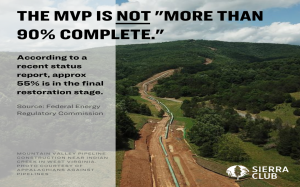Mountain Valley Pipeline Halted in Jefferson National Forest by U. S. Fourth Circuit Court
From an Article by Laurence Hammack, Roanoke Times, July 10, 2023
The federal appeals court has ordered the Mountain Valley Pipeline not to resume construction in the Jefferson National Forest.
Late Monday afternoon, a three-judge panel of 4th U.S. Circuit Court of Appeals issued a stay of construction while it considers arguments that Congress violated the separation of powers doctrine when it passed a law expediting completion of the controversial project.
The brief order came from Chief Judge Roger Gregory and Judges Stephanie Thacker and James Wynn. The same three judges have set aside nearly a dozen permits issued to Mountain Valley over the past five years.
The case involved a challenge, filed by The Wilderness Society, of a provision in the Fiscal Responsibility Act, which suspended the federal debt ceiling to avoid a government default.
Tucked into the larger law was language ordering federal agencies to issue all remaining permits to Mountain Valley and stripping the Fourth Circuit of its jurisdiction to hear any legal challenges of the approvals.
The Wilderness Society argued that because the law was unconstitutional, the Fourth Circuit should continue to hear its case, which challenges a U.S. Forest Service permit that allows the pipeline to cross through 3.5 miles of the national forest in Giles and Montgomery counties.
There had been no decision by 5 p.m. Monday on a second request for a stay — which if granted would affect a much larger portion of a 303-mile pipeline that runs from northern West Virginia, through the New River and Roanoke valleys, to connect with an existing pipeline near the North Carolina line.
In that case, also pending before the Fourth Circuit, a coalition of environmental groups led by Appalachian Voices contests a finding by the U.S. Fish and Wildlife Service that endangered species would not be jeopardized by the buried, 42-inch diameter pipe.
Since the Fiscal Responsibility Act was passed in early June, construction crews have started to return to the unfinished portions of the pipeline, which Mountain Valley hopes to have in operation by the end of the year.
“We are reviewing the court’s decision and will have additional comment to follow in the coming days,” company spokeswoman Natalie Cox wrote in an email late Monday.
Construction of the pipeline has come in fits and starts since it began in the winter of 2018, mostly due to government permits being set aside by the Fourth Circuit. Many of the three-judge panel’s decision have been based on environmental concerns about a project that has been cited more than 400 times with violating erosion and sedimentation control regulations.
Monday’s decision came just hours after lawyers for the joint venture of energy companies building the natural gas pipeline argued in court papers that both legal challenges should be dismissed.
Any challenge to the law’s constitutionality should be made not to the Fourth Circuit but to a federal appeals court in Washington, D.C., attorney George Sibley wrote. “Congress’s message was crystal clear: If you want to challenge Section 324 [the portion of the law that fast-tracked Mountain Valley], you must do so in the D.C. Circuit,” Sibley wrote.
It was not clear when the Fourth Circuit might rule on the arguments made by the Wilderness Society, Appalachian Voices and the other environmental groups who say Congress violated the Constitution by asserting its power over that of the courts.
But before granting a stay, the court had to find in favor of the Wilderness Society on four factors, including whether it had made a strong showing that its legal challenge will ultimately be successful.
Spencer Gall, an attorney with the Southern Environmental Law Center who represents The Wilderness Society, argued in court papers that it was likely to prevail — and that it faced “irreparable harm” if a stay was not granted.
“In sum, a stay would protect the public interest in forestalling unlawful environmental harm and would not impair any other public interests,” Gall wrote.
